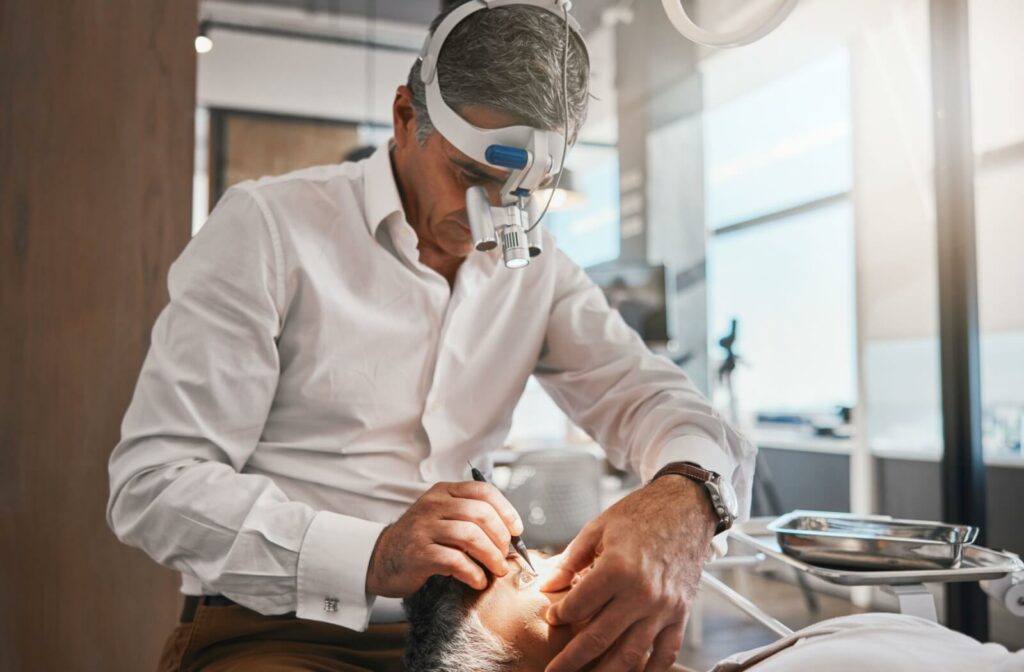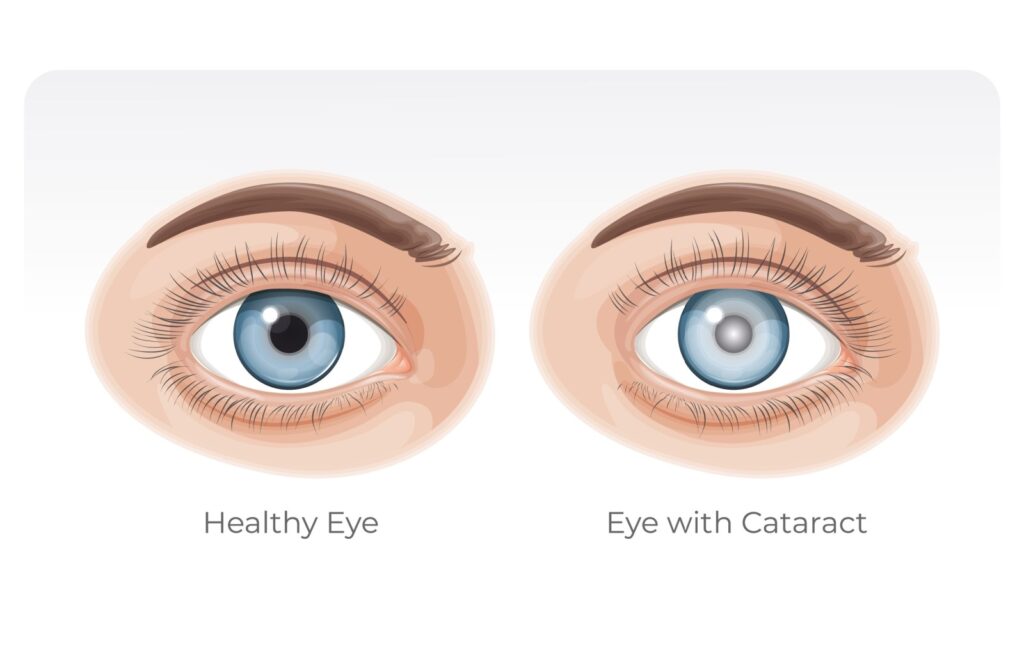Cataract surgery is the most common and effective treatment for cataracts, a condition where the eye’s natural lens becomes cloudy, leading to blurred vision. During the procedure, the cloudy lens is removed, and an artificial intraocular lens (IOL) is implanted to restore clear vision, often immediately.
Typically performed as an outpatient procedure, cataract surgery allows patients to go home the same day, with many experiencing significant vision improvements within days. While cataracts do not return after surgery, some patients may develop posterior capsular opacification (PCO) later, where the membrane holding the lens becomes cloudy, causing a gradual decline in vision.
This condition is common post-surgery but can be easily treated with a quick outpatient procedure called YAG laser capsulotomy, which creates an opening in the cloudy membrane to restore clear vision.
While the surgery is performed by an ophthalmologist, our eye care team at Lake Country Optometry will help co-manage your post-operative care to ensure your recovery is as easy as possible. We are able to see you for assessments and refer you back to your ophthalmic surgeon for treatment, if required.
Understanding Posterior Capsular Opacification (PCO)
Although cataracts do not return after surgery, patients may experience a similar decline in vision due to Posterior Capsular Opacification (PCO). This condition occurs when the capsule that holds the artificial lens becomes hazy or cloudy over time. It can occur months or even years after cataract surgery.
PCO can cause symptoms such as blurred or cloudy vision, glare or halos around lights and difficulty reading or performing daily tasks. These symptoms can significantly impact a person’s vision and quality of life.
Treatment Options for PCO
The good news is that PCO is easily treatable with a quick outpatient procedure called YAG laser capsulotomy. During this procedure, a special laser creates an opening in the cloudy capsule, allowing light to pass through and restoring clear vision.
This procedure is usually performed without any anesthesia, as it is painless and highly effective. Patients may experience some mild discomfort or floaters immediately afterwards, but these symptoms typically subside within a few days.
Keeping Your Eyes Healthy After Cataract Surgery
While PCO is a potential complication of cataract surgery, there are several proactive steps you can take to reduce your risk and maintain the health of your eyes:
- Follow Post-Surgery Care Instructions: Always adhere to the care instructions provided by your ophthalmologist. This includes following the prescribed eye drop regimen to keep your eyes lubricated and prevent infection. Avoid strenuous activities and heavy lifting as much as possible, as these can put unnecessary strain on your healing eyes.
- Attend Regular Follow-Up Appointments: Regular check-ups with your eye care professional are essential for monitoring the health of your eyes. These appointments allow for early detection of potential issues, enabling timely intervention if any concerns arise. Staying in touch with your optometrist can provide peace of mind and help maintain your eye health.
- Maintain a Healthy Lifestyle: A balanced diet rich in fruits, vegetables, and nutrients can play a significant role in eye health. Foods high in antioxidants, such as leafy greens and fish, can help combat oxidative stress. Regular physical activity is also essential, as it promotes overall well-being and can help manage conditions like diabetes that linked to eye health. Avoiding smoking and limiting alcohol consumption can further reduce your risk of developing eye-related issues.
- Protect Your Eyes from UV Rays: When spending time outdoors, wearing sunglasses with UV protection or hats with brims can shield your eyes from harmful ultraviolet rays. Long-term exposure to UV light has been linked to the development of various eye conditions, so taking these precautions can be vital in preserving your vision.

The Importance of Eye Exams Post-Recovery
As mentioned, it’s crucial to prioritize follow-up appointments with your optometrist after undergoing eye surgery. These check-ups allow for monitoring of the healing process and detection of any potential complications that may arise. Even after recovering from surgery, it’s essential to continue attending regular eye exams.
During these appointments, your eye care professional will assess your visual acuity and overall eye health. They can also address any concerns or discomfort you may be experiencing. In addition to checking for changes in vision, they can also evaluate the effectiveness of post-surgery treatments.
Regular eye exams are especially important for those who have undergone cataract or LASIK surgery, as these procedures require long-term follow-up care to ensure the best outcomes.
Professional Cataract Evaluation & Management at Lake Country Optometry
Cataracts are a common age-related condition that can significantly impact one’s vision. While cataract surgery is an effective treatment option, there is a small risk of developing PCO afterward. By understanding the potential factors that may influence the development of PCO and taking preventive measures, you can reduce your risk and maintain clear vision for years to come.
Our team at Lake country Optometry is dedicated to providing comprehensive eye care, including cataract evaluation and post-surgery management. If you have any concerns about cataracts or would like to schedule an eye exam, please don’t hesitate to reach out to our practice.




